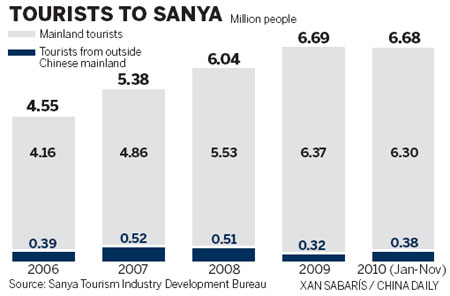Top News
Island: paradise for some shoppers
Updated: 2010-12-27 09:54
By Shi Yingying (China Daily)
New duty-free policy
According to him, the only reason duty-free goods need to be picked up at the airport is to protect products that are not duty-free. "Think about it. If the same product has different price tags in the same shop, what would happen to the ones that are not duty-free? We're doing what overseas duty-free shops do. It's an international convention." Duty-free commodities are exempted from import duty, import linkage excise tax and import linkage value-added tax. They are not only available at airports, but also on flights, at borders, on ocean-bound ships, at ferry terminals, at railway stations and in downtown duty-free shops.
CDF is the only State-owned enterprise specializing in the duty-free business. It was established in 1984 and now has more than 200 outlets in 29 provinces, municipalities and autonomous regions in China.
The difference between duty-free shops in Hainan and Jeju Island in South Korea, according to Zhou Jun, a spokeswoman for Korea Tourism Organization's Shanghai office, is that the former are State-owned enterprises and the latter are managed by private companies in a relatively free market.
|
||||
"To take a simple example, duty-free shops in the island extend their opening hours specially for travelers on cruise ships from 8:30 pm to 10 pm, simply because they have the biggest spending power."
According to the commerce department of Hainan provincial government, all duty-free outlets, whether already open or yet to be opened in the province, have to be run by CDF.
"We'd like to attract both domestic and foreign investors if possible so that the service and competitive power of the industry are guaranteed," said a spokesperson for the department, who declined to give his name.
In its defense, CDF said enjoying duty-free status was a concession by the State and if it was not controlled by a State-owned company, nobody could assure customers about the discount.
Tourists to Hainan

No matter who ultimately benefits, Hainan's tourist market is bound to grow. Hainan is expected to become a global tropical island resort destination by 2020, and the tourism industry is expected to contribute 12 percent of Hainan's gross domestic product by then.
The major local airline, Hainan Airlines, increased by 25 percent the number of its domestic flights going to Sanya from this summer to winter. "Now we have around 84 flights heading to Sanya from all around China every week," said Tan Hui, spokesman for Hainan Airlines.
"New routes from Urumqi, Lanzhou, Changsha and Wuhan (to Sanya) are expected in the future," he said. "Some of them will have an in-flight duty-free service."
E-paper

Ear We Go
China and the world set to embrace the merciful, peaceful year of rabbit
Preview of the coming issue
Carrefour finds the going tough in China
Maid to Order
Specials

Mysteries written in blood
Historical records and Caucasian features of locals suggest link with Roman Empire.

Winning Charm
Coastal Yantai banks on little things that matter to grow

New rules to hit property market
The State Council launched a new round of measures to rein in property prices.




